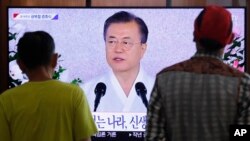South Korean President Moon Jae-in on Thursday offered an olive branch to Japan to end a tense trade dispute, saying Seoul will “gladly join hands” if Tokyo to accepts calls to resolve it through dialogue.
Moon in a nationally televised speech also downplayed the threat posed by North Korea's recent short-range ballistic launches and expressed hope that Washington and Pyongyang would soon resume nuclear negotiations.
Moon's speech at a ceremony marking the 74th anniversary of Korea's liberation from Japanese colonial rule at the end of World War II come amid heightened public anger over Tokyo's recent moves to impose trade curbs on South Korea, which triggered a full-blown diplomatic row.
Tens of thousands of South Koreans are expected to march in anti-Japan protests planned throughout Thursday.
Seoul has accused Tokyo of weaponizing trade to target its export-dependent economy and retaliate against South Korean court rulings calling for Japanese companies to offer reparations for aging South Korean plaintiffs for their World War II forced labor. Tokyo's measures struck a nerve in South Korea, where many people still harbor strong resentment over Japan's ruthless colonial rule of the Korean Peninsula from 1910 to 1945.
After threatening stern countermeasures and declaring that South Korea would “never lose” to Japan again, Moon had taken a more conciliatory tone over the past week amid relief in Seoul that the impact of Japan's trade measures may not be as bad as initially thought.
There has also been concerns that the government's nationalistic calls for unity in face of what Moon previously described as an “unprecedented” crisis were allowing public anger toward Japan to reach dangerous levels.
“If a country weaponizes a sector where it has a comparative advantage, the order of peaceful free trade inevitably suffers. A country that accomplished growth first must not kick the ladder away while others are following in its footsteps,” Moon said at the ceremony at the Independence Hall in the city of Cheonan.
“If Japan better late than never chooses the path of dialogue and cooperation, we will gladly join hands,” he said.
South Korea's trade row with Japan came amid worsening bilateral relations with North Korea, which has been ignoring Seoul's calls for dialogue and in recent weeks test fired a slew of new short-range weapons that would potentially expand its ability to strike targets throughout the South, including U.S. military bases there.
Experts say the North's recent launches are aimed at building leverage ahead of a resumption of nuclear negotiations with the United States, which have stalled in recent months, and also dialing up pressure on Seoul to coax major concessions from Washington on its behalf.
“In spite of a series of worrying actions taken by North Korea recently, the momentum for dialogue remains unshaken, which is a significant result of my government's peace process on the Korean Peninsula,” Moon said.
“Now is the time for both Koreas and the United States to focus on resuming working-level negotiations between Pyongyang and Washington at the earliest possible date.”
South Korea said Monday that it has decided to remove Japan from a list of nations receiving preferential treatment in trade in possible retaliation for Tokyo's downgrade of Seoul's trade status.
The impact of the tighter controls isn't clear since Seoul said some exporters to Japan could receive exceptions and continue to use a fast-track approval process rather than undergoing case-by-case inspections on sensitive shipments to nations with lower trade status.
Japan similarly allowed exemptions when it removed South Korea as a favored trade partner, which eased some of the fears in Seoul about a possible blow to its economy, where many manufacturers heavily rely on parts and materials imported from Japan.
S. Korea's Moon Calls for Talks to End Trade Row with Japan




